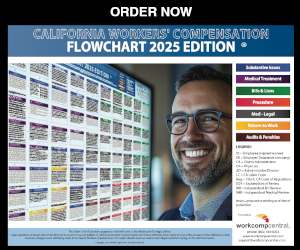Industry Insights
February 17, 2016
To Dream the Impossible Dream
- National
- - 0 shares
To reverse and reinstate this claim based on an unachievable reinstatement effort would have required basically rewriting over 100 years of the Illinois Workers' Compensation Act and Rules—one has to wonder if sanctions should lie?
In Farrar v. Illinois Workers' Compensation Commission, issued Feb. 11, a unanimous Appellate Court, Workers' Compensation Division was faced with the oddest of Illinois workers' compensation claims—petitioner was a pilot for a major international airline. She alleged an injury occurring in April 2003. She underwent a cervical fusion alleged to be part of the claim. While we don’t know more of the facts, we assure our readers this is a serious claim that might have had some merit, if it had been properly handled by her counsel.
The initial claim was filed almost five years later in February 2008. Please remember it is possible for the statute of limitations in Illinois workers' compensation to “toll” or expand if any medical/temporary total disability or permanency is paid. Payment of a related medical bill under group health might also take a toll on the statute of limitations, under Section 6.
For reasons known only to her attorneys and Capt. Farrar, the claim was allowed to badly age and then get dismissed for want of prosecution. A dismissal order was issued in 2011 and became final when 60 days passed following entry of the order.
From our perspective, the matter was done, finito, finished, kaput. If you read the applicable Rule and case law interpreting it, the Illinois Workers' Compensation Commission lost all jurisdiction over this claim. Despite that irresistible fact, another law firm filed their appearance for petitioner and then filed a new Application for Adjustment of Claim in April 2012 for the same accident that occurred in 2003! The arbitrator dismissed the second claim in July 2013, the commission affirmed in February 2014 and an appeal to the Circuit Court was taken. Almost four years later, the second claim is now actually over with this Appellate Court ruling.
Claimant cited Section 13- 217 of the Illinois Code of Civil Procedure (735 ILCS 5/13-217 (West 1994)) as supposed authority for “refiling” the Illinois workers' compensation claim within one year after it was dismissed for want of prosecution, regardless of the language of Commission Rule 9020.90 or whether the statute of limitations had long expired. The Illinois Appellate Court, Workers’ Comp Division unanimously ruled Section 13-217 of Code of Civil Procedure, which allows a plaintiff with a claim pending in the Circuit Court to refile within one year after dismissal for want of prosecution (regardless of whether the statute of limitations expired during pendency of original action) does not apply to Illinois workers' compensation claims. The Appellate Court ruled dismissal of a workers' compensation claim for want of prosecution requires claimant to file for reinstatement within 60 days of receipt of dismissal in order to allow the Arbitrator to reinstate within the Rule.
Should Supreme Court Rule 137 Sanctions Be Considered?
As court observers and longtime proponents of the defense side of the workers' compensation industry, we feel this protracted litigation, following dismissal of the initial claim and the passing of the 60-day period for reinstatement, rendered any further action an unhappy and complete waste of the time and money for this employer. We further assert if a defense firm has spent four years clowning around at the Illinois Workers' Compensation Commission and then the Circuit and Appellate Court with pleadings that had zero chance of success, the Appellate Court may have appropriately considered sanctions against a defense firm on their own motion. There is case law where the Appellate Court, Workers’ Compensation Division ruled Illinois Supreme Court Rule 137 sanctions may lie in workers’ comp claims that reach the reviewing courts for frivolous actions.
The rule says:
The signature of an attorney or party constitutes a certificate by him that he has read the pleading, motion or other document; that to the best of his knowledge, information and belief formed after reasonable inquiry it is well grounded in fact and is warranted by existing law or a good-faith argument for the extension, modification or reversal of existing law, and that it is not interposed for any improper purpose, such as to harass or to cause unnecessary delay or needless increase in the cost of litigation.
In our respectful and academic view, there is no chance, none, that this pleading was “warranted by existing law.” The monies spent to win final dismissal at arbitration, Illinois Workers' Compensation Commission appeal and in two reviewing courts could have been put to much better use by this major U.S. employer. In short, this second application should never have been filed, and it was a colossal waste to have our hearing officers take time from other important duties to get rid of it. Please also note there is also the potential for a legal malpractice claim that might have been considered by Capt. Farrar. This interim five-year circus that followed might possibly have misled her and delayed such a claim.
Eugene Keefe is a founding partner of Keefe, Campbell, Biery & Associates, a Chicago workers' compensation defense firm. This column was reprinted with his permission from the firm's client newsletter.
Advertisements
Columns
- CAAA: Audit Exposes Deep Failures at Cal/OSHA 07/30/25
- Paduda: Work Comp Remains the Darling of P&C Industry 07/28/25
- Wroten: The Flip Side of Regulations 07/25/25
- Moore: Were We Right About Comp in 2022? 07/23/25
- Kamin: WCIRB Says Carriers Losing Money Due to Rising Costs 07/21/25
- Paduda: What's Happening in Golden State Work Comp? 07/18/25
- CAAA: Fireworks Warehouse Blast Exposes Flaws in Safety, Oversight, Accountability 07/16/25
- Gelman: Asbestos Ban Is a Win for Workers 07/14/25
- Snyder: Mediation Confidentiality 07/11/25
- Snyder: Settle and Sue: Don't Let It Happen to You 07/09/25
- Kamin: State Senate Committee to Consider SIBTF Bill 07/07/25
- Anders: Self vs. Professional MSA Administration: Which Is Right for the Injured Worker? 06/30/25
- Geaney: Court Affirms Finding of Police Officer's Joint Employment 06/27/25
- Fricker: A New Era for Comp Subrogation 06/25/25
- Kamin: AI for HR Equals Bad Injury Reporting 06/20/25
- Montgomery: Will DWC Ignore New Law? 06/18/25
- Kamin: 4th DCA Clarifies DOI From Date of Knowledge 06/16/25
- Wade: Are the Old Ways Gone? 06/13/25
- Snyder: Trust Your Intuition 06/12/25
- Montgomery: DIR Director Reportedly Resigning 06/11/25
Now Trending
- Workers' Compensation News
-
Calif. Appeals
Court Upholds $1M Jury Award in
Wrongful Death…
Posted on Jul 30, 2025
-
Calif. WCIRB
Releases State of System…
Posted on Jul 28, 2025
-
Calif. Company
Settles Allegations of
Misclassifying Franchisees as…
Posted on Jul 29, 2025Richard Harrington says: “Like an independent contractor, wouldn't a franchisee also be responsible for setting…”
-
Calif. Auditor:
Understaffing, Process Deficiencies
Hamper Enforcement of Worksite…
Posted on Jul 31, 2025
-
Calif. WCIRB
Announces 2025 X-Mod…
Posted on Jul 29, 2025
-
Texas Court Cites
Ruttiger in Vacating $750,000 Jury
Award for Bad Faith…
Posted on Jul 28, 2025
-
Mont. Carrier's
Belated Payment of Settlement
Doesn't Warrant…
Posted on Jul 29, 2025
-
N.Y. IG Announces
Conviction of Double-Dippers…
Posted on Aug 1, 2025
-
Neb. Worker Gets
Award for Foot Injury, but Not for
Anxiety,…
Posted on Jul 31, 2025
-
Ariz. ICA Posts
New Form for Notice of Claim…
Posted on Jul 25, 2025
Jobs
Upcoming Events
Aug 26, 2025
Claims Association of Greater
Join the Claims Association of Greater Chicago (CAGC) for a day of golf, networking, and fun at Th …
Sep 2-4, 2025
San Diego Elevate Workers' Com
We are thrilled to announce that Early Bird registration is OPEN for ELEVATE® 2025! This year's …
Nov 7, 2025
WIMAH 2025 Workers’ Compensati
Join Hawai'i’s premier workers’ comp event for expert insights, top-tier networking, and standout …
Social Media Links
c/o Business Insurance Holdings, Inc.
Greenwich, CT 06836




No Comments
Log in to post a comment